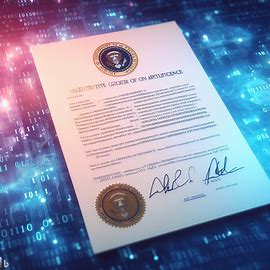Longworth: Biden’s historic move for AI safety
On Nov. 1, a momentous event unfolded in the realm of artificial intelligence (AI).
American President Joe Biden issued an executive order (EO) that has been described as a landmark move in the pursuit of safe, secure and trustworthy AI. It not only signifies a significant step for the United States, but also sets a global precedent for the first-ever AI executive order from the US government.

I am, like many others, an enthusiastic supporter of an organization which embodies a commendable strategy for harmonizing technology with humanity’s long-term interests. This organization is the non-profit Centre for Humane Technology (CHT), co-founded by the visionary Tristan Harris. Interestingly, Tristan engaged in a pivotal discussion with the president during this historic occasion, focusing on the vital matter of regulating AI.
The EO, with its broad scope, touches on numerous facets of AI, and this pivotal meeting holds the promise of reshaping the future of AI. In what follows, we embark on a journey to explore the details of this extraordinary encounter and delve into the potential trajectories which the United States might be charting in the ever-evolving world of AI.
A presidential roundtable unveiling the future of AI
The roundtable discussion, hosted in San Francisco, aimed to address the risks and potential benefits associated with AI. It was a moment where the president made his unwavering commitment known – a commitment to safeguarding American rights, protecting privacy, combatting bias and disinformation, and ensuring the safety of AI systems before their deployment.
This gathering brought together a diverse array of stakeholders, each holding a piece of the puzzle in the AI landscape. The discussion tackled pivotal topics such as AI fairness, discrimination, predictive policing, and the enormous potential AI holds in areas like cancer drug development and climate change mitigation. The impact of AI on truth, trust and democracy was also a central point of concern, particularly in the context of AI-generated misinformation and disinformation.
One of the shining stars in this constellation of thought leaders was Tristan Harris of CHT. He emphasized the significance of the diverse range of stakeholders present, including luminaries like Joy Buolamwini from the Algorithmic Justice League. The discussion encompassed the implications of AI in predictive policing and facial recognition, underlining the necessary for public interest funding to harness AI’s potential for addressing critical societal issues. Additionally, the conversation revolved around how AI can exasperate challenges related to spreading false information that can influence financial markets and public perception.
A positive impression and a call for international cooperation
Harris reported the interaction with President Biden and his team left a positive impression. Their commitment to addressing AI-related challenges was clear, and it was underlined that ongoing engagement on this issue is crucial. Notably, Senator Chuck Schumer’s recent announcement of plans for AI regulation in congress emphasize the urgency of the matter.
Regulating AI presents unique challenges due to its rapid development and digital nature, which enables it to spread globally at the speed of data. Harris drew an insightful parallel with the historical example of nuclear weapons, where international coordination led to significant treaties and reductions in nuclear arsenals. He suggested similar international corporation is necessary to effectively address AI’s challenges.
Balancing innovations and responsibility
While the primary focus of the roundtable meeting was not to propose specific regulations, it aimed to identify and deliberate on the various issues associated with AI. However, Harris hinted at ongoing discussions about specific proposals, including the idea of holding companies liable for downstream harms resulting from AI model releases. This concept could potentially temper the rapid deployment of AI technologies by making companies responsible for potential negative consequences.
Harris underscored the high stakes involved in AI regulation, referencing a statistic that 50 per cent of AI researchers believe there is a 10 per cent or greater chance of humans facing extinction due to the inability to control AI. Although he did not explicitly confirm his inclusion in the 50 per cent, Harris emphasized the need for an honest assessment of AI risk to take necessary actions to mitigate them. He expressed concerns about the existing dangerous capabilities of AI and called for public engagement in advocating for international regulation and safeguards to manage these risks effectively.
In conclusion
To summarize, President Biden’s roundtable in San Francisco was a watershed moment that addressed the challenges and promises of AI. It covered a wide range of issues, from fairness and discrimination to misinformation and their potential impacts on truth, trust, and democracy. Tristan Harris and the CHT team stressed the administration’s commitment to addressing AI challenges and the critical need for international corporation in regulating AI. Although specific regulatory proposals were not discussed in detail during the meeting, ongoing discussions are taking place, with a focus on potential liability for companies to mitigate risks associated with AI technologies. Harris’s emphasis on the high stakes involved in AI regulation reminds us the responsible development and deployment of AI technologies are paramount to our shared future.
Any questions related to this column, kindly send an email to richardlongworth@rogers.com.
To read all Richard Longworth’s columns, click here.
For 40 years Richard Longworth worked as a systems engineer and university professor at Capilano University teaching math, information technology, and system analysis, design and implementation. Longworth has published three books: Reflections on Life Issues, Turning the Self Inside Out, and Harnessing the Internet into a Knowledge Framework – all related to technology and trends in the industry. His present work includes Prompt Engineering for ChatGPT AI.














If you read one book about Artificial Intelligence (AI), make it this one. Mustafa Suleyman’s “The Coming Wave” is an intelligent and thoughtful overview of AI. His book presents the arguments for why AI is a different technological threat from past waves of change, how it can be wielded for good and ill, and how it might be (somewhat) contained. Advances in AI are converging in a tsunami of simultaneous advances in robotics, biotechnology, and quantum computing to create an unstoppable force that will change global power structures and possibly the existence of nation states. While Suleyman describes 10 steps for partial containment of these threats, he acknowledges that issues in politics, society, and human nature make their successful and widespread implementation unlikely. Biden’s roundtable is only a first step.